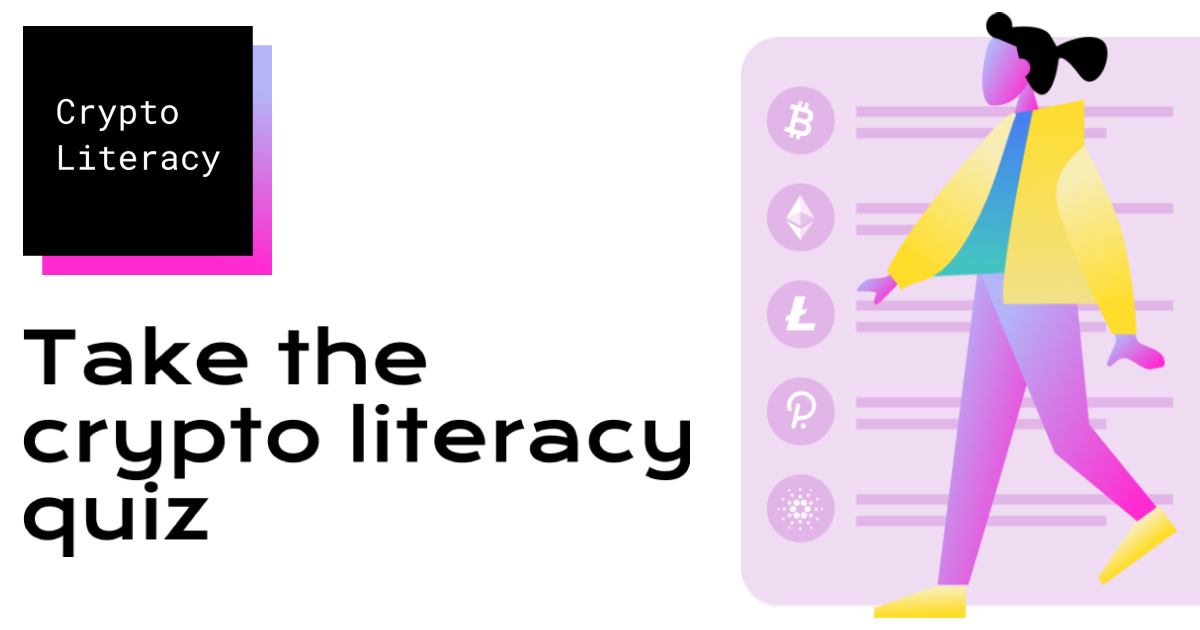Weekend ETH Prices |
Weekend BTC Prices |
| ETH Friday at 5pm: $4,427
ETH Weekend Low: $4,177 ETH Weekend High: $4,394 ETH Price as of posting: $4,288 Performance YTD: +492.72% |
BTC Friday at 5pm: $62,536
BTC Weekend Low: $60,173 BTC Weekend High: $62,411 BTC Price as of posting: $60,855 Performance YTD: +108.15% |
Welcome back to the weekend round-up and be sure to read all the way until the end with crypto learning opportunities. I’m especially excited for this weekend’s round-up because November is crypto literacy month! Taken from cryptoliteracy.org, “CryptoLiteracy.org is an industry initiative promoting broad consumer education of digital currency. Led by Coinme, CoinDesk, the Digital Currency Group, and Pantera Capital, the website is the home of the official Crypto Literacy Quiz. Readers can assess their cryptocurrency knowledge, identify gaps in their understanding, and challenge their family and friends’ digital currency proficiency. The initiative is part of Crypto Literacy Month, held each November, featuring insights from global survey participants as well as an educational curriculum curated by CoinDesk’s Crypto Explainer+ series.” Find out where you are by taking the crypto literacy challenge at www.cryptoliteracy.org


On to the news! Over Halloween weekend the Bitcoin white paper turned 13 years old, Facebook…er….Meta’s commitment to the Metaverse was a hot topic, more US & global regulatory updates, and an update on El Slavador’s Bitcoin deployment.
Bitcoin Whitepaper turns 13
Ah those teenage years, y’all remember those? Not unlike humans Bitcoin’s teenage years look to be it’s most formative. How will nations integrate Bitcoin, and crypto overall, into society? Will the macro thesis play out and Bitcoin the asset challenge gold and fiat for monetary supremacy as the worlds go to hard money asset? Will the Bitcoin network dominate as the most secure and efficient monetary network? Will they both be regulated out of existence? Will something new entirely come to life?
I found myself thinking about Nassim Taleb’s book Antifragile when reflecting on these questions, Bitcoin’s history so far, and what’s to come for the growing digital asset space. Bitcoin and the Bitcoin network have not broken from 13 years of FUD, volatility, uncertainty, and shocks to the system. On the contrary, it has thrived in an uncertain and chaotic world. The next 13 years will come with harder challenges than those before. We, like many others, believe digital assets and the blockchain technology underpinning them are here to stay and will grow stronger as the greatest minds come together to face these upcoming challenges.
Get caught up on the journey so far, infused with some humor, with this article from Cointelegraph over the weekend.

Facebook goes Meta
With the announcement during the week of Facebook’s rebrand to Meta and it’s commitment to building out the metaverse, this weekend everyone’s takes came in, both from traditional and crypto worlds. One of my favorite takes was from Brendan from Dharma:
So basically it’s Ethereum vs. Facebook in a race to create a compelling Metaverse.
Open vs. Closed.
Transparent vs. Opaque.
Permissionless vs. Permissioned.
Community Owned vs. Zuck Owned.My bets are placed. Let’s build a better future together.
— Brendan from Dharma (@brendan_dharma) October 28, 2021
A recent episode of the Breakdown by NLW dove into this exact topic. Host Nathaniel Whittemore poses a thought-provoking question at the end:
“Is there a place for Facebook in the Metaverse you want?”
What can’t be understated is that Facebook company stock lives inside most investors’ portfolios. With its transition to Meta, clients will now have an indirect exposure to the crypto space via Meta, should they choose to hold. Advisors will now have to answer the questions, “Should I hold Meta stock in my portfolio? What is the Metaverse? Why did they do this? What does this mean for the company?”
So what is the Metaverse? A great article I read last year about the Metaverse came from Cathy Hackl on Forbes. Another great resource are interviews Rao Paul conducted via his platform Real Vision Crypto earlier this year.
/https%3A%2F%2Fspecials-images.forbesimg.com%2Fimageserve%2F1139090510%2F0x0.jpg)


Global Regulatory Updates
In the US, as part of the $1.85 Trillion spending bill, a couple tax loopholes are set to be closed by applying constructive sale rules as well as wash sale rules. Reported by Jeff Benson at decrypt.co, “Section 1259 of the Internal Revenue Code outlines transactions that are subject to capital gains, a type of tax levied on certain investment earnings. A key function of the constructive sale rule, first created in 1997, was to stop hedge funds from getting around short-terms capital gains taxes. By keeping a short and long position in the same asset, hedge funds had found a loophole: they could turn short-term capital gains into long-term ones, capping their taxes at a much more favorable rate. The bill, if passed, would extend the rule to cryptocurrency transactions.” As for wash sale rules, “Neither the Blockchain Association nor Coin Center, two major advocacy groups, objected to applying the wash-sale rule to cryptocurrency.”
The U.S. Department of Justice (DOJ) is looking for someone to head its newly announced National Cryptocurrency Enforcement team. The DOJ posted a job opening for the director’s role on USAJobs, the Federal government’s jobs website. Reported by James Rubin at Coindesk, “The director will lead a team of prosecutors in investigating and prosecuting cryptocurrency cases as part of a national effort to prevent the use of crypto for illegal purposes.”
In India it looks like they will not be moving forward with an outright ban on digital assets. This is extremely positive since an India ban was one of the main pieces of FUD detractors would point to as to why crypto will not survive. As reported by Karishma Asoodani, “A legal framework to regulate and govern the burgeoning cryptocurrency investment market in India may now see the light of the day by next February. Finance Ministry officials have told Business Today Television that a law for cryptocurrencies would most likely come around by the time of the next general Budget. The proposed framework is likely to veer away from an earlier approach that had proposed a complete ban on cryptocurrencies. Instead, the government is likely to opt for regulating cryptocurrencies as an “asset” class, somewhat on the lines of commodities, with appropriate taxation of transactions and gains. Officials of the Finance Ministry and the Reserve Bank of India (RBI) remain engaged in fine-tuning the conceptual framework and the necessary regulations, another official added. The thinking, the Finance Ministry official said, was towards a regulation that seeks to avoid potential pitfalls.”
FATF, The Financial Action Task Force, recently released it’s updated crypto guidance modifying it’s guidelines set back in April 2020. Reported by Jeff Benson, “The new guidance makes at least two major changes. First, it revises the definition of who qualifies as a VASP. It states that the current definition “is meant to exclude ancillary participants that do not provide or actively facilitate any of these covered activities, such as entities which provide Internet or cloud services.” In short, VASPs must control cryptocurrency, not just facilitate its use by, for example, creating computer code for a decentralized finance application. Second, it updates the “travel rule,” which requires financial institutions to record and report information about senders and receivers of electronic fund transfers worth at least $3,000, as it applies to crypto transactions. That’s been clarified to apply to transfers between VASPs, but not transfers to a private wallet.” These updated guidelines provide some added clarity but still a far cry from what is needed.





Identity Thieves Exploit El Salvador’s Chivo Bitcoin Wallet’s Setup Process
Reported by Andrew Engler at Coindesk, “Hundreds of Salvadorans say hackers opened Chivo Wallets with their ID numbers to claim the $30 bitcoin incentive dangled by Nayib Bukele’s government. Between Oct. 9 and Oct. 14, Cristosal, a human rights organization in El Salvador, received 755 notifications of Salvadorans reporting identity theft with their Chivo Wallets, Rina Montti, the group’s director of human rights research, told CoinDesk.”
This does not look good for El Salvadore’s adoption of Bitcoin. If the systems don’t work well enough and aren’t secure enough to stop rudimentary hacking, why would you even use the Chivo wallet? This only makes the case for Bitcoin’s network that much stronger as a monetary system.

Learning Opportunities
Exploring The Disruptive Potential of Blockchain and Digital Assets with Global X ETF’s
Thursday November 4th, 11:30am ET

Crypto Clarified with VanEck
“A new mini video series crypto clarified, CEO Jan van Eck breaks down some of the most pressing crypto questions investors had in easy-to-follow short videos.”

Thank you for reading this all the way through. Be sure to tell someone today you care about them!
Stay safe, healthy, and happy!
– Marc
……………………………………………





